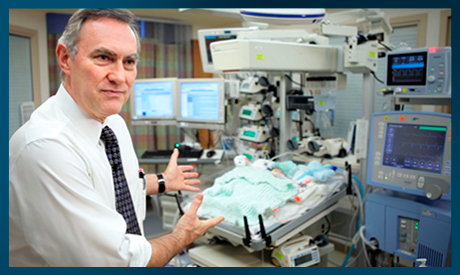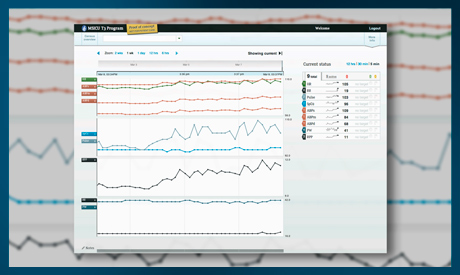T3: An early warning system for catching ICU crises before they happen
In June 2012, the Cardiac Intensive Care Unit (CICU) and Medical/Surgical Intensive Care Unit (MSICU) at Boston Children's Hospital will launch an innovative new platform that has the potential to revolutionize critical care.
This new platform, called T3 (for "Tracking, Trajectory and Triggering"), will bring together and streamline the multiple flows of information that our critical care doctors and nurses use to make life-saving decisions. Being developed by Peter Laussen, MBBS, chief of Children's Division of Cardiovascular Intensive Care, and Melvin Almodovar, MD, former medical director of the CICU, this web-based, scalable system will bring together in real time all data coming from the bedside monitors keeping watch over each child in the CICU and MSICU.

This is significant, as there can be 10 or more monitors at each bed in our intensive care units, all recording vital information about how each patient is responding to treatment. Processing and reacting to this amount of complex, ever-changing information can be overwhelming, and increases the risk of medical error. Doctors and nurses rely on training, experience, methods and treatment guidelines to bring data together and calculate trends on the fly in response to what they see on a child's monitors. Their decisions are often made prescriptively based on intuition, rather than predictively based on real-time data analysis.
Clearly, doctors and nurses have a need for a better early warning system that helps them catch impending critical problems before they happen.
Laussen and his team are designing T3 to:
-
Track all of the information coming out of a patient's numerous monitors.
-
Calculate trends in the data and show a patient's real-time trajectory: Are they getting better? Are they getting worse? Are they responding to care as we think they should?
-
Trigger action to avoid crises and make the most efficient use of the resources available in the units.

The T3 system could raise the quality of care in ICUs by helping care teams make predictive, data-driven decisions, rather than prescriptive, intuitive ones. It will also help capture, archive and analyze information for creating new critical care best practices and procedures in the future.
Learn more about our MSICU.
